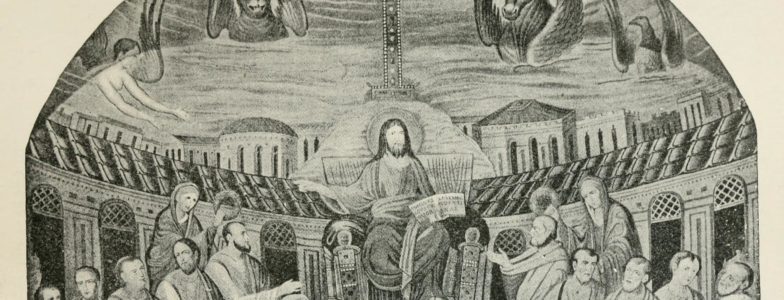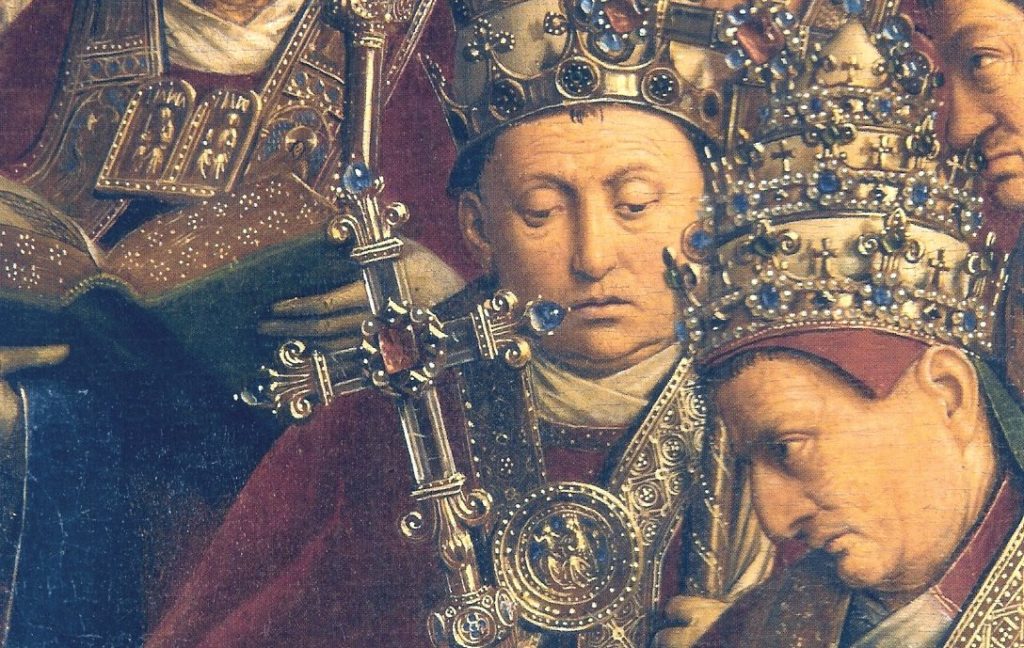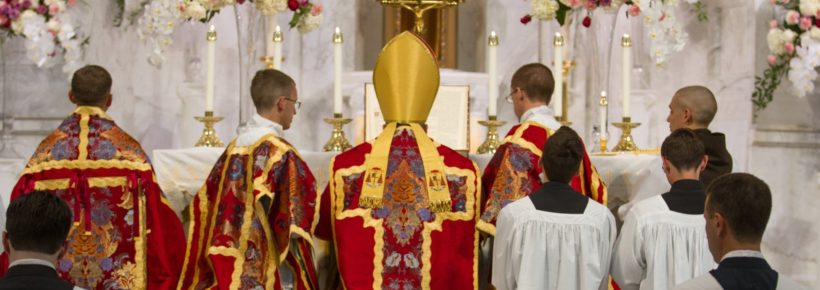Almost everyone knows that the Catholic Church opposes abortion. However, few are aware of the long and rich history of the Church’s reverence and respect for human life, and fewer still can explain exactly why the Church cannot change her teachings on abortion.
This article will address a number of common questions regarding the teachings of the Catholic Church on abortion.
The Catholic Church on Abortion: Misconceptions
Misconception 1: The Catholic Church Holds a “Position” on Abortion.
The Church does not take a “position” on abortion, nor does she have a mere “opinion” on it. Positions and opinions are temporary decisions based on a subjective understanding of current circumstance, and therefore are liable to change. The Church interprets the natural law, which she cannot change any more than she can repeal the principles of magnetism and gravity. This interpretation is by necessity objective and permanent.
Our understanding of this interpretation of natural law may be refined, but the principle itself is never changed.
Misconception 2: The Catholic Church Once Permitted Abortion.
The Religious Coalition for Reproductive Choice (RCRC) summarizes the most important pro-abortion misconceptions about the early history of Church teachings regarding abortion. RCRC said:
“Catholic theology, which now regards the early fetus as a person, did not always do so. The Church first adopted the belief of Aristotle, St. Jerome, St. Augustine, and St. Thomas Aquinas that ensoulment occurs several weeks after conception. Pope Innocent III, who ruled at the turn of the 13th Century, made that belief part of Church doctrine, allowing abortion until fetal animation. It was not until 1869 that the Church prohibited abortion at any time and for any reason.”1

St. Basil the Great
To begin with, the Catholic Church has never approved of or condoned abortion during any part of its history. Various Middle Age-era theories about ‘formed’ and ‘unformed’ fetuses and ‘delayed ensoulment’ or ‘delayed animation’ were intellectual exercises focused on more accurately understanding the development and nature of the soul, but not on determining the morality of abortions.
This is shown by the fact that theologians who held these views consistently condemned abortion in the strongest possible terms. As far back as the fourth century, St. Basil the Great, who was obviously familiar with this controversy, said, “The hairsplitting difference between formed and unformed makes no difference to us. Whoever deliberately commits abortion is subject to the penalty for homicide …. Let her that procures abortion undergo ten years’ penance, whether the embryo were perfectly formed or not.”2
Just as importantly, the Catholic Church has never accepted the theory of delayed animation. The only time that the Church has ever addressed this question is when Pope Innocent XI officially condemned the theory that animation took place at birth.
Misconception 3: Church Teaching on Abortion is Inconsistent
Like other abortionists, illegal practitioner Ruth Barnett knew that she would drum up a lot more business if she could convince Catholic women that the Church was being “inconsistent” on the subject. She wrote:
“Until the end of the 16th Century with the reign of Pope Sixtus V, the Church did, indeed, permit the termination of pregnancies within 40 days of conception for a male and 80 days for a female — the old Aristotelian concept … But I believe that a case can be made — and many intelligent Catholics have agreed with me — that the Church’s attitudes towards abortion have varied in past history, are not always consistent and can, like other elements of Catholic dogma, be changed to meet man’s increased enlightenment and changing social conditions.”3
The teachings of the Catholic Church have been uniformly against abortion in any form, and have been stated and restated consistently through the centuries.
The earliest surviving written catechism is the Didache, or The Teaching of the Twelve Apostles, which dates back to the late first century. It said, “You shall not murder.… You shall not procure abortion, nor destroy a newborn child.”4
In the year 197, Tertullian wrote in his Apologeticus:
“For us [Christians], murder is once and for all forbidden; so even the child in the womb, while yet the mother’s blood is still being drawn on to form the human being, it is not lawful for us to destroy. To forbid birth is only quicker murder. It makes no difference whether one takes away the life once born or destroys it as it comes to birth. He is a man, who is to be a man; the fruit is always present in the seed.”
An overwhelming number of other early Church theologians carefully examined the methods, motives, morality and metaphysics surrounding abortion. They unanimously described all abortions as a heinous sin, including:
- Barnabas (in A.D. 137)
- Athenagoras of Athens (A.D. 177)
- Minucius Felix (c. 200-225)
- Hippolytus, Bishop of Pontius
- Ephraem the Syrian
- Lactantius
- Cyprian, Bishop of Carthage
- Ephipanius, Bishop of Salamis
- Methodius, Bishop of Olympus
- St. John Chrysostom, Bishop of Constantinople
- Clement of Alexandria, known as “The Father of Theologians”
- St. Augustine of Hippo
- St. Jerome
- St. Ambrose, Bishop of Milan
- St. Basil the Great
- The assembled Councils of Ancyracanon (314), Elvira in Granada, Spain (305), Chalcedon (451) and Ancyra in Galatia, Asia Minor (314).5
Keep in mind that all of these condemnations of abortion by theologians and councils took place before the beginning of the sixth century, and Church condemnation of abortion in all cases has continued uninterrupted since that time.
Misconception 4: Popes Regularly Change Church Teaching on Abortion
The popes have always taught — in accordance with Church teachings — that abortion is murder. However, some confusion exists because the penalties for the murder of a preborn child have been changed several times in the history of the Church.
In 1588, Pope Sixtus V tried to discourage abortion by reserving absolution to the Holy See alone. It soon became evident that such an arrangement was impractical, and so in 1591, just three years later, Pope Gregory XIV returned absolution for abortion to the local bishop.6
In 1679, Pope Innocent XI condemned the writings and teachings of two theologians, Thomas Sanchez and Joannis Marcus, who believed that abortion was lawful if the fetus was not yet animated or ensouled and the purpose of the abortion was to prevent shame to the woman.7 This act showed decisively that the Church did not tolerate abortion, and was willing to correct those who spread error regarding child-killing.
Misconception 5: Abortion Was Not Forbidden Until 1869, in Pope Pius IX’s Reign
Abortion supporters allege that, in the year 1869, Pope Pius IX condemned abortion for the very first time.
In reality, what Pope Pius did was officially remove the distinction between the animated and unanimated fetus from the Code of Canon Law.8 This action dealt not with theology, but with discipline, and simply made the punishment for abortion at any stage uniform. The Pope removed the distinction in order to support the Church’s teaching that life and ensoulment both begin at conception.
Conclusion
Pro-abortionists allege that Catholics can ignore a Church teaching that has not been held from the very beginning of its history, implying that, if it had been taught from the beginning, they would be obliged to obey it. From the very beginning of her history, the Catholic Church on abortion has been consistent: she has always taught that abortion is gravely sinful.
The Catechism of the Catholic Church teaches:
“Since the first century the Church has affirmed the moral evil of every procured abortion. This teaching has not changed and remains unchangeable. Direct abortion, that is to say, abortion willed either as an end or a means, is gravely contrary to the moral law” [¶2271].
+ Endnotes
[1] Religious Coalition for Abortion Rights (now RCRC). June 1978 propaganda pamphlet entitled “ABORTION: Why Religious Organizations in the United States Want to Keep it Legal.”
[2] St. Basil the Great, priest (c. 329-379), First Canonical Letter, from the work Three Canonical Letters. Canons 2 and 8. Loeb Classical Library, Volume III, pages 20 to 23.
[3] Ruth Barnett. They Weep On My Doorstep [Beaverton, Oregon: Halo Publishers], 1969, pages 106 and 107.
[4] The Didache (“The Lord’s Instruction to the Gentiles through the Twelve Apostles”). II, 2, translated by J.A. Kleist, S.J., Ancient Christian Writers, Volume 6. Westminster, 1948, page 16.
[5] Barnabas (c. 70-138), Epistle, Volume II, page 19; Athenagoras of Athens, letter to Marcus Aurelius in 177, Legatio pro Christianis (“Supplication for the Christians”), page 35; Minucius Felix, theologian (c. 200-225), Octavius, p. 30; Tertullian, theologian (150-225), Treatise on the Soul, pages 25 and 27; Clement of Alexandria, priest and the “Father of Theologians” (c. 150-220), Christ the Educator, Volume II, page 10; St. Augustine, Bishop of Hippo (354-430), De Nuptius et Concupiscus (“On Marriage and Concupiscence”), 1.17; Cyprian, Bishop of Carthage (c. 200-258), Letters, page 48; St. Jerome, Bible Scholar and translator (c. 340-420), Letter to Eustochium, 22.13 Hippolytus, theologian and Bishop of Pontius, Refutation of All Heresies 9.7(A.D. 228); Lactantius, Divine Institutes 6:20 (A.D. 307); Ephipanius, Bishop of Salamis (c. 315-403); Ephraem the Syrian, theologian (306-373), De Timore Dei, page 10; St. Ambrose, Bishop of Milan (c. 339-397), Hexameron, 5.18.58; St. Basil the Great, priest (c. 329-379), First Canonical Letter, from the work Three Canonical Letters. Canons 2 and 8. Loeb Classical Library, Volume III, pages 20 to 23; St. John Chrysostom, Homilies on Romans 24 (A.D. 391); the Council of Ancyracanon 21, (A.D. 314); Council of Elvira in Granada, Spain (305), Canons, 63 and 68; Council of Ancyra in Galatia, Asia Minor (314), Canon, 21. The Declaration on Procured Abortion tells us that “It is true that in the Middle Ages, when the opinion was generally held that the spiritual soul was not present until after the first few weeks, a distinction was made in the evaluation of the sin and the gravity of penal sanctions. Excellent authors allowed for this first period more lenient case solutions which they rejected for following periods. But it was never denied at that time that procured abortion, even during the first days, was objectively grave fault. This condemnation was in fact unanimous” [¶7].
[6] Lucius Farraris, Bibliotheca Iuridica Moralis Theologica. Roma: 1885, I, pages 36 to 38.
[7] Denzinger-Schoenmetzer. Enchiridion Symbolorum [Rome: Herder], 1965, pages 2,134 to 2,135.
[8] Codicus Iuris Canonici Fontes. 9 Volumes. Rome, 1923 to 1939, specification number 552.
Related Content
Dr. Brian Clowes has been HLI’s director of research since 1995 and is one of the most accomplished and respected intellectuals in the international pro-life movement. Best known as author of the most exhaustive pro-life informational resource volume The Facts of Life, and for his Pro-Life Basic Training Course, Brian is the author of nine books and over 500 scholarly and popular articles, and has traveled to 70 countries on six continents as a pro-life speaker, educator and trainer.













Exodus 21:22-24. If two men are fighting and one injures a pregnant woman and the fetus is killed, he shall repay her according to the degree of injury inflicted upon *her*,and not the fetus.
Author Brian McKinley, a born-again Christian, comments:
“Thus we can see that if the baby is lost, it does not require a death sentence-it is not considered murder. But if the woman is lost, it is considered murder and is punished by death.”
This is grounded in Exodus 21:22. That biblical passage outlines the Mosaic Law in a case where a man is responsible for causing a woman’s miscarriage, which kills the fetus.
If the woman survives, then the perpetrator has to pay a fine to the woman’s husband. If the woman is killed, the perpetrator is also killed. This indicates that the fetus has value, but does not have the status of a person.
Pro-life apologists say at least the unborn has *some* value in the Old Testament, if not actual or real personhood. But the New Testament is more permissive than the Old Testament!
Jesus repeatedly upheld Mosaic Law (Matthew 5:17-19; Mark 10:17-22; Luke 16:17) as did his apostles (see chapters 10, 15, and 21 of Acts). Paul, however, claims Mosaic Law has been abolished, referring to his previous adherence to the Law as “so much garbage…”
So even if you could find a verse in the Old Testament indicating concern for the unborn, Paul, and not Jesus, says it’s “garbage.”
Paul doesn’t say anything about abortion in any of his epistles, but would it matter if he had?
Conservative Christians are quick to condemn anyone preaching a false gospel, but some conservative Christians argue not only that they’re not under Mosaic Law, but that they don’t have to follow Paul, either, because Paul claims the risen Jesus said to him three times “…my grace is sufficient for thee…” and they take this biblical verse as a license to do as they please.
If their view prevails, then:
What basis do pro-life Christians have for prohibiting abortion?
Doesn’t “three times…” permit abortion?
Secular pro-life arguments are religion-neutral and thus applicable to everyone, including atheists and agnostics.
The pro-life movement ALREADY HAS the support of organized religion.
Instead of preaching to the choir, i.e., wasting time with religion, pro-lifers should focus on embryology and prenatal development, DNA, RNA, etc. to make their case to our mainstream secular society.
This is truly confusing; a Church law can change in what it dictates is a sin. At this time Mother Church says all abortion, including contraception, is a mortal sin. Next year will they allow it? Say what you mean and stick to it.
Actually, the point of the article is that the Church has never changed its position and cannot change on this issue. But glancing at the article, because “Misconceptions” is at the top of the list, if read quickly, it can sound as if the Church endorsed abortion. We will clarify this article in the editing so it is super clear but no, the Church has never endorsed abortion. In 2,000 years, that’s a pretty good record of constancy!
The problem is that there is a difference between condemning Abortion and equating it to Murder. The church didn’t always condemn Abortion AS murder.
The church had Condemned Abortion, It also condemned eating meat on Good Friday, not going to Church every Sunday, Masturbation, Premarital Sex. They condemned it as something had to be repented. THAT IS ALL
The Church had previously believed in delayed ensoulment and therefore wasn’t murder until ensoulment.
For 2000 years it was a SIN, but NOT murder.
Adultery is a SIN, it is not ILLEGAL.
Homosexual acts is a SIN.
Birth Control is a SIN (You even acknowledge this in a recent post)
Masturbation is a SIN
Pre-Marital Sex is a SIN
Taking the Lord’s Name in Vain is a SIN
Not going to Sunday Mass is a SIN
NONE are ILLEGAL nor are there laws to prevent them from happening.
So just because Abortion is a SIN, doesn’t mean it is or should be ILLEGAL
IT isn’t MURDER, even according to the church up to the late 1800’s
Please explain the incongruity here?
What does the claim that “”the Church has never endorsed abortion.” have ANYTHING to do with “The Church has NOT, for 2000 years, considered Abortion Murder” This is NOT a good record of Consistency. THAT is the point we argue. We are not saying that the church ever thought it wasn’t a SIN. We aren’t claiming that the Church had originally not considered it a SIN and it is only now considered one. WE are saying the Church has changed position on that the fetus’s was not always considered a person and Abortion was not always an act that requires severe punishment. The church has not always called women or abortionists murderers nor called for them to be subject to judicial secular laws (Or even religious justice systems) of the time. In fact, the penalty for Abortion was less than that of non-vaginal sex or birth control use in Church penitentials.
If the Church had always supported that Abortion was Murder then those fetus were babies/people. They had souls or intodays parlance, personhood. Why aren’t, to this day, miscarriages and stillbirth not baptized for over 2000 years? (The concept of limbo was was only recently – 2007 – changed BUT the doctorine dictates that the Church can NOT baptize the dead) Why aren’t they baptizing in the womb?
Dear Chibi, thank you for your question. You are actually misinformed and mixing up what is legally and legal under civil or state law, versus what is considered sin in the church, venial vs. mortal sin, and addressing them all on an equal playing ground. Because something is forbidden in Church law as a grave sin has no relationship to what the government says is legal or illegal. We are guessing you have not been catechized in the Catholic Church, so we will explain some basics to help.
So for instance, let us take the sin of intercourse outside of marriage. This is a serious sin in the Church. If you are Catholic and commit a grave sin, then you do this knowing it is a grave sin, and with free consent, that means that without confession and repentance, this sin is serious enough that if you die, you will not be going to Heaven. However, you will not land in jail.
You raise issues of abortion as sin, implying that it is only “recently” the case. That is categorically untrue. Abortion was condemned even in the old Testament.
https://www.catholic.com/tract/abortion
Cite your source and we will be happy to disprove it. You also seem to wonder why miscarried babies and babies in utero are not baptized. To be baptized, one has to be born. Limbo is part of the evolving teaching of the Church. Traditionally, the belief handed down is one unbaptized cannot see the Kingdom of God. Yet, Popes like Benedict have stated that we really do not know, this is a mystery, and while it may well be true, God in His mercy may take these souls straight to Heaven. Utimately, we trust in Him.
It appears you did not answer Chibi’s comment on the church not always condemning abortion as murder, about which Chibi seems to be correct. Yes, sometimes abortion was condemned as murder, such as in the Didache. But some of the most crucial (and most intellectual) figures in the history of the Catholic church such as Augustine and Aquinas were heavily influenced by the teachings of Aristotle and did not believe that abortion which occurred prior to ensoulment was murder. There also is ostensibly a letter of Pope Innocent III’s in which he ruled that an abortion which occurred prior to ensoulment was not murder, but I have not been able to find a reliable database of the Pope’s letters; perhaps you have access to one. If this is true, then it was incorrect when you said in your article that the popes always taught that abortion was murder. It would seem that, at least to Pope Innocent, it was not always murder.
As for the interpretation of Exodus 21, you have been somewhat reckless. The widespread assumption in both Judaism and the early days of Christianity was that “the child coming out” was dead. There was no penalty if the child was dead. You asked for sources, so I’ll mention Josephus’ Antiquities of the Jews (I think it might be in Book III, I haven’t read it in awhile) and Philo’s explications of Old Testament law. Philo and Josephus are our best insights into the opinions of Jews and Christians at the time of Jesus on these issues and they both clearly interpret the passage as referring to a dead child. Common sense also would suggest that a premature birth caused by trauma, especially in that day and age, would be far more likely to result in a dead child than a live one. The harm mentioned in the next verse therefore clearly refers to harm caused to the woman. No harm can befall the fetus because it is not alive; such is the opinion of Josephus and Philo (and Aquinas and Augustine). Even if Philo and Josephus (and most of the Jews before them) are wrong regarding the interpretation of Exodus and the Catholic church is right, this sstill means that Jesus was almost certainly taught in his rabbinical education that life does not begin at conception/early abortion is not murder and it’s noteworthy that Jesus never brings up this rather crucial issue.
This is not to say that abortion is not a sin. I would agree that the influential figures in the Catholic Church have been relatively consistent in their opinion that abortion is a sin. But they have not been consistent in their opinion on when it constitutes murder, and they have not been consistent in their opinion on whether or not life begins at conception (indeed, many early sources from around the time of Jesus, most notably Lucretius’ De Rerum Natura, suggest that the belief that life did not begin until birth was widespread and probably dominant)
Also please don’t say things like “Cite your source and we will be happy to disprove it.” Say “Cite your sources and we will discuss it.” You should be open to the idea that you could be wrong. You want people of other religions to be open to the sources you site and open to the idea that they might be wrong. Please hold yourself to the same standard.
Dear Friend,
Unfortunately, I am unaware of the identity of the staff member to whom you addressed your comments. However, here are some facts from the USCCB Commitee on Prolife Activity, regarding the Church’s constant teaching regarding respect for unborn life.
https://www.usccb.org/issues-and-action/human-life-and-dignity/abortion/respect-for-unborn-human-life
I hope this helps!
Yes, due to a lack of understanding of embryology, there was a dispute whether abortion constituted murder or contraception. Both are terrible crimes, but murder is the graver of the two.
As to miscarriages and stillbirths, it is not possible for any sacrament to be given to the dead. If there is doubt as to whether or not the intended recipient is still living, baptism is to be conferred conditionally, “If you live, I baptize you in the Name of the Father, and of the Son, and of the Holy Spirit.” Baptism must necessarily be administered using water flowing over the recipient’s flesh. As such, it is not ordinarily possible to baptize in utero, though baptism will be administered if the womb is opened during surgery. Baptism is of doubtful validity if the water does not touch the recipient’s head, so if the head is inaccessible during such a baptism, the baby will be conditionally baptized after birth, “If you are not already baptized, I baptize you in the Name of the Father, and of the Son, and of the Holy Spirit.”
Do you what the dyslexia, the words are all a jumbled mess, or the mind can’t keep things straight. All the information states abortion falls under the Commandment You shall not comit murder